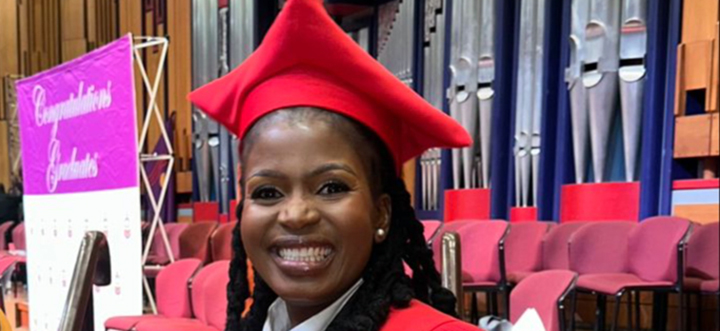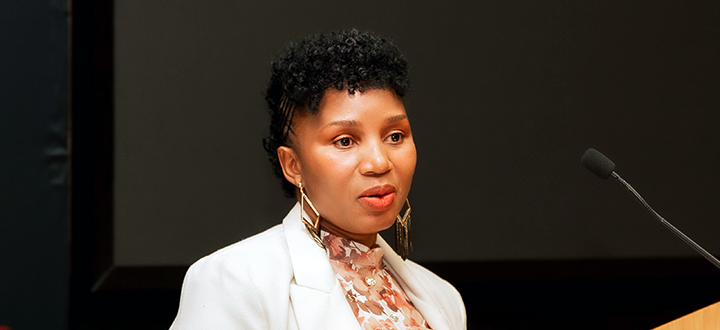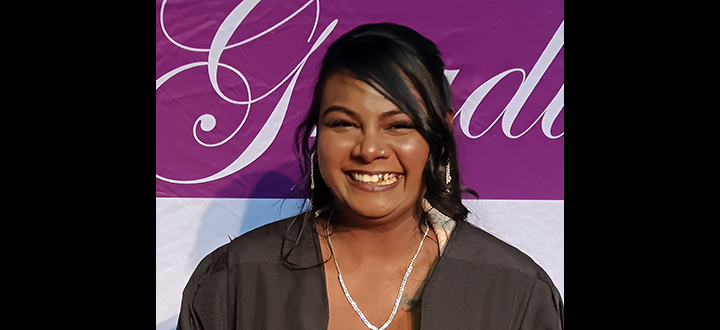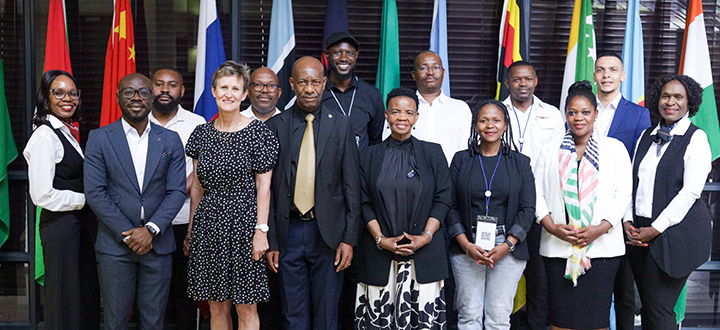College of Human Sciences
From Unisa Radio to exploring Bosadi Womanism

Dr Mercy Bvuma
A journey of a thousand miles began at Unisa Radio for Dr Mercy Bvuma, a lecturer in the Department of Communication Science. Her resilience and commitment to achieving her goals inspire many Unisans.
Bvuma started working at Unisa Radio as a newsreader and ventured into the academic space. However, she says the academic bug has always been there, and it was instilled in her by her mother. "I was raised by a mother who was not only an academic but also a fervent proponent of social advancement and education," she says. "She instilled in us a sense of intellectual curiosity and the conviction that education is a means of personal development and our obligation to make a significant contribution to society from a young age."
Bvuma adds that the abundance of books in her household, encompassing a wide range of genres from science texts to African literature and novels, fostered a passion for critical thinking and reading. "Growing up in that environment, where learning was both encouraged and modelled daily, pursuing further education felt like a natural and purposeful extension of who I was becoming," she explains. "It was never solely about obtaining a degree; it was about fostering the ability to think deeply, act equitably and positively impact the world."
Bvuma paints a picture of her upbringing in Atteridgeville, a vibrant township west of Pretoria. Growing up in a close-knit community, she was constantly surrounded by the everyday stories, struggles and triumphs of ordinary Black South Africans. They lived in a community with principles of Ubuntu, where a neighbour’s child was your own, discipline was instilled and sharing was the norm. These experiences would later shape the lens through which she engaged with academic research.
Bvuma maintains that her deep and advancing interest inspired her research in Black women's spiritual and cultural expressions, particularly within African Independent Churches (AICs). In her thesis entitled "Decolonising the wearing of church uniforms amongst Black women in selected African Independent Churches: A Bosadi transformative missiology", Bvuma used theories of decoloniality, Bosadi and transformational missions to develop a Bosadi transformative missiology framework. This framework is relevant for exploring the decolonial elements, symbolic value and intersections of African spirituality and Christianity in wearing church uniforms.
Using a qualitative research method, her study found that a Bosadi transformational missiology enables mission organisations to offer practical strategies to engage respectfully with Bosadi-informed ideas on church uniforms. Through Black women in AICs, the study advances an exhaustive understanding of the role of missiology in relation to the cultural and spiritual implications of wearing church uniforms.
Bvuma hopes that her work will significantly enhance the growing body of decolonial and African feminist scholarship that prioritises the lived experiences, spiritual traditions, and knowledge systems of Black women. "My research highlights mundane religious and cultural expressions of women in AICs, challenging prevailing Eurocentric paradigms that have traditionally suppressed or marginalised African epistemologies," she says. "It necessitates a reconfiguration of theology, identity and religious practice through an African-centred perspective that respects indigenous cosmologies, communal philosophical views and embodied spirituality. My objective is to facilitate a paradigm shift that critiques colonial and patriarchal narratives while affirming the intellectual, theological and cultural contributions of Black women, especially in religious institutions and academic environments where their voices have been historically marginalised or devalued. This endeavour aims to establish a framework for fresh epistemologies grounded in African femininity, experiential spirituality and communal ethics."
When asked about her future plans, she says she intends to further her contributions to scholarly discourse by publishing her research in peer-reviewed journals, particularly emphasising decolonial theology, gender and African spirituality. "My research is in accordance with and aims to expand upon the extensive expertise of pioneering African women theologians, including Professor Isabel Apawo Phiri, Professor Philomena Mwaura, and Professor Madipoane Masenya, whose contributions have significantly influenced the feminist theological discourse on the continent," she says. "Their work inspires my dedication to prioritising the spiritual practices, knowledge systems and lived experiences of African women in academic environments that have historically marginalised them."
Bvuma expresses her sincere appreciation to the College of Human Sciences, especially her previous CoD, Prof Siyasanga Tyali, for acknowledging the importance of allowing her R&D leave, facilitating intense involvement in her study. She thanks her academic supervisor, Prof SM Kgatle, for his unwavering support during this research endeavour. She continues: "I express my profound gratitude to my research participants from the Zion Christian Church (ZCC), Saint John Apostolic Faith Mission (SJAFM), and Sega Apostolic Church for their invaluable contributions and involvement, which proved crucial to the successful completion of this study."
The Department of Communication Science Chair, Prof Rhofiwa Mukhudwana, says the department is immensely proud to celebrate Bvuma on the successful completion of her PhD, which elevates Bosadi Womanism, one of Unisa’s catalytic niche areas. "It is a moment of joy, not only for her but for all of us who recognise the significance of this achievement," says Mukhudwana. "As a woman in academia, her success carries deep meaning. It speaks of courage, dedication and excellence. I look forward to the continued impact of her work in the department, in academia and beyond."
* By Nnana Martina Jege, Communication and Marketing, CHS
Publish date: 2025-06-26 00:00:00.0


 Wings of opportunity: Bringing drones into the classroom
Wings of opportunity: Bringing drones into the classroom
 Visionary youth champion to address Unisa’s Innovation Festival
Visionary youth champion to address Unisa’s Innovation Festival
 Finding the strength to persevere
Finding the strength to persevere
 Disability awareness at Unisa: Disability is not inability
Disability awareness at Unisa: Disability is not inability
 Unisa symposium shares knowledge on building SA's aviation economy
Unisa symposium shares knowledge on building SA's aviation economy